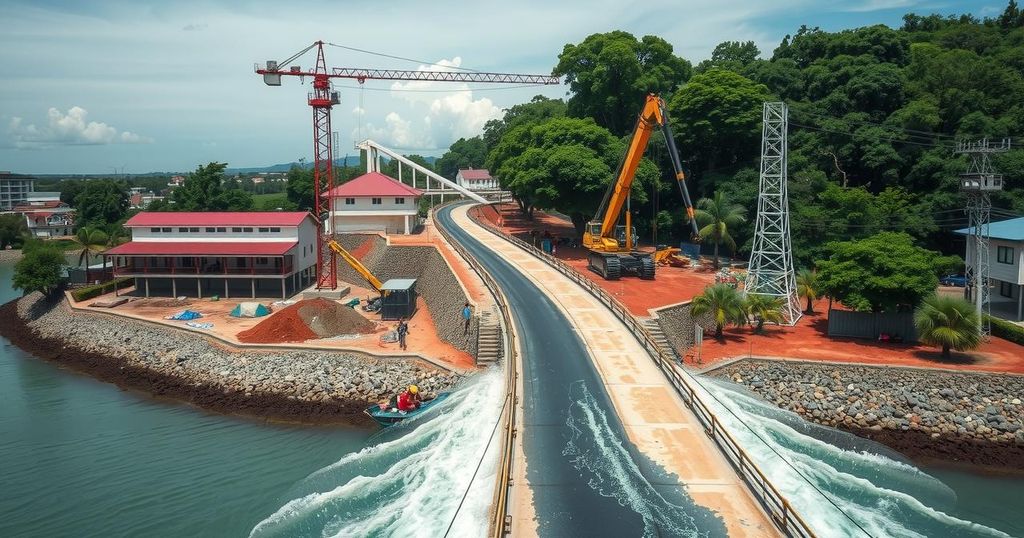Guyana has protested against Venezuela’s recent construction of a bridge on a disputed island that both countries claim, reiterating its stance on sovereignty in the Essequibo region, a historically contested area. This move has reignited tensions and prompted Guyana’s Foreign Minister to summon the Venezuelan Ambassador, emphasizing violations of previous agreements and international law. The situation remains critical as both nations approach a resolution through the International Court of Justice.
The government of Guyana has officially lodged a protest with Venezuela following the construction of a bridge by the Venezuelan armed forces on a disputed river island that both nations claim. This development has reignited tensions regarding the borders in the Essequibo region, where Venezuela has long been engaged in a territorial dispute with Guyana. Guyana’s Foreign Minister, Hugh Todd, summoned Venezuelan Ambassador Amador Perez Silva to express the nation’s condemnation of the bridge, which allegedly connects to an illegally established military base on Guyanese territory.
Venezuela’s actions are seen as violations of not only Guyanese sovereignty but also of international law, according to Todd. The controversy stems from historical claims dating back to the 19th century when an arbitration commission determined the boundaries, a decision that Venezuela contests, asserting that it was unfair. Notably, two-thirds of Guyana’s territory comprises the Essequibo region, which has been under Guyana’s control since its independence in 1966.
In 2022, Venezuelan President Nicolas Maduro threatened potential annexation of the Essequibo, after proposing an alarming referendum among Venezuelans regarding the region. However, Caribbean leaders, alongside Brazil and the United Nations, had previously orchestrated a summit to promote peace and a mutual resolution to the dispute. Guyana has since brought the case to the International Court of Justice in The Hague, further pursuing a peaceful resolution to this protracted territorial conflict.
Guyana’s ministry insists that any military activities undertaken by Venezuela in the region must cease immediately, stressing the importance of upholding previous agreements made for peaceful dispute resolution. The ministry has indicated that Guyana will continue to advocate for its territorial rights internationally and awaits Venezuela’s response to their court submissions by August 2024.
The ongoing territorial dispute between Guyana and Venezuela, particularly concerning the Essequibo region, is rooted in historical grievances regarding boundary demarcation set during the late 19th century. Venezuela asserts that the arbitration conducted by the British was inequitable and has sought to reclaim this resource-rich territory over the decades. The Essequibo territory is significant for its natural resources, including oil, and its control is tied to both national pride and economic interests for both nations. Despite temporary diplomatic resolutions, acts of aggression, such as the recent bridge construction, threaten the ongoing peace talks and legal proceedings.
In summary, the construction of the bridge by Venezuela has escalated tensions with Guyana, resulting in a formal protest and reflections on sovereignty and international law. As both countries navigate this complex dispute rooted in historical claims, the international community’s role becomes increasingly important in maintaining peace and seeking a resolution. Guyana remains committed to resolving these issues through legal and diplomatic channels, awaiting Venezuela’s response regarding the International Court of Justice proceedings.
Original Source: caribbean.loopnews.com






